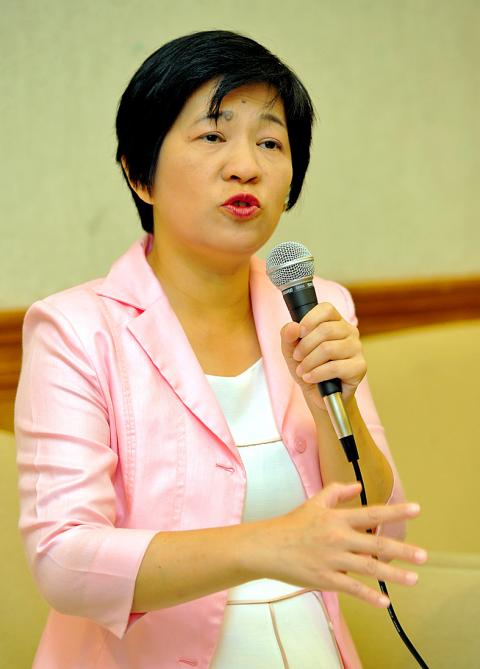Former Taiwan Solidarity Union (TSU) legislator Huang Wen-ling (黃文玲) yesterday said she had not ruled out running for Changhua County commissioner in November as an independent despite such a move possibly hurting the pan-green camp’s chances of winning the constituency.
“Whether or not a candidate should run in an election should be decided by the voters, not by political parties,” Huang, who was stripped of her TSU membership because she insisted on running, told a press conference.
She had begun preparing her campaign after former president Lee Teng-hui (李登輝) last year encouraged her to run and her motivation was made even stronger after the Sunflower movement, said Huang, who served as TSU lawmaker from 2012 to this year.

Photo: Lo Pei-der, Taipei Times
Due to TSU headquarters’ insistence that the pan-green camp should only have one candidate, the party suspended Huang’s membership. Huang said she respected the decision.
The Democratic Progressive Party has nominated Legislator Wei Ming-ku (魏明谷) as its candidate in the county.
Huang said she was not concerned about the negative impact of a so-called “pan-green split” if she entered the race, since the county has always been a Chinese Nationalist Party (KMT) stronghold and her primary goal would be garnering support from independent voters.
Her father, former Changhua County commissioner Huang Shih-cheng (黃石城), supports her decision to run, she said.
Asked if she would accept an “integration mechanism” that select a final pan-green camp candidate between Wei and her by a public opinion poll, Huang Wen-ling said that “it would eventually come down to the people’s decision.”
She pledged government transparency if she was elected, promising that the contents and documents of all government meetings would be released online within 45 minutes of a meeting’s conclusion.

Alain Robert, known as the "French Spider-Man," praised Alex Honnold as exceptionally well-prepared after the US climber completed a free solo ascent of Taipei 101 yesterday. Robert said Honnold's ascent of the 508m-tall skyscraper in just more than one-and-a-half hours without using safety ropes or equipment was a remarkable achievement. "This is my life," he said in an interview conducted in French, adding that he liked the feeling of being "on the edge of danger." The 63-year-old Frenchman climbed Taipei 101 using ropes in December 2004, taking about four hours to reach the top. On a one-to-10 scale of difficulty, Robert said Taipei 101

Nipah virus infection is to be officially listed as a category 5 notifiable infectious disease in Taiwan in March, while clinical treatment guidelines are being formulated, the Centers for Disease Control (CDC) said yesterday. With Nipah infections being reported in other countries and considering its relatively high fatality rate, the centers on Jan. 16 announced that it would be listed as a notifiable infectious disease to bolster the nation’s systematic early warning system and increase public awareness, the CDC said. Bangladesh reported four fatal cases last year in separate districts, with three linked to raw date palm sap consumption, CDC Epidemic Intelligence

Two Taiwanese prosecutors were questioned by Chinese security personnel at their hotel during a trip to China’s Henan Province this month, the Mainland Affairs Council (MAC) said yesterday. The officers had personal information on the prosecutors, including “when they were assigned to their posts, their work locations and job titles,” MAC Deputy Minister and spokesman Liang Wen-chieh (梁文傑) said. On top of asking about their agencies and positions, the officers also questioned the prosecutors about the Cross-Strait Joint Crime-Fighting and Judicial Mutual Assistance Agreement, a pact that serves as the framework for Taiwan-China cooperation on combating crime and providing judicial assistance, Liang

US climber Alex Honnold left Taiwan this morning a day after completing a free-solo ascent of Taipei 101, a feat that drew cheers from onlookers and gained widespread international attention. Honnold yesterday scaled the 101-story skyscraper without a rope or safety harness. The climb — the highest urban free-solo ascent ever attempted — took just more than 90 minutes and was streamed live on Netflix. It was covered by major international news outlets including CNN, the New York Times, the Guardian and the Wall Street Journal. As Honnold prepared to leave Taiwan today, he attracted a crowd when he and his wife, Sanni,